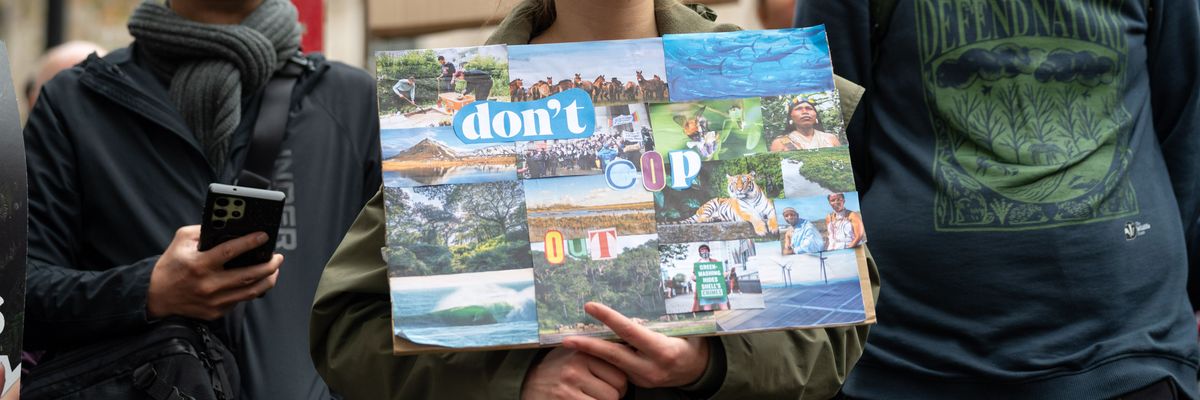
After critics of big polluters warned of “corporate capture” in the lead-up to the United Nations Climate Change Conference based on previous summits, one advocacy group announced Monday that more than 500 carbon capture and storage lobbyists have gained access to COP30 in Belém, Brazil.
CCS—also called carbon capture, use, and storage—involves capturing carbon dioxide, generally from industrial or power generation facilities, and then either finding a use for it or storing it underground. Opponents and skeptics have long called it a risky “false solution” that extends reliance on planet-heating fossil fuels and distracts from a global shift to renewables.
The Center for International Environmental Law identified 531 CCS lobbyists attending this year’s ongoing summit—the largest number since CIEL started analyzing registrations for the annual conference. The group explained that the oil and gas industry and other CCS advocates are highlighting the massive energy needs of booming artificial intelligence “to cement further fossil fuel expansion, using carbon capture promises to mask the devastating climate impact.”
CIEL fossil economy director Lili Fuhr said in a statement that “the fossil fuel industry has found in AI’s energy demand a new narrative to justify its survival—and in carbon capture, the perfect illusion. CCS cannot make fossil fuels ‘clean’; it just keeps them burning. It doesn’t curb emissions; it locks them in.”
“The world… needs a future rooted in renewable energy, accountability, and justice, and a climate process with a robust conflict of interest policy.”
“When governments fall for the AI and carbon capture fairytale of the CCS lobbyists, they open a new escape hatch for the fossil fuel industry, undermine global climate efforts, and delay the urgently needed phaseout of coal, oil, and gas,” she argued. “The world doesn’t need fossil-fueled tech fantasies justifying business as usual for big polluters and Silicon Valley billionaires. It needs a future rooted in renewable energy, accountability, and justice, and a climate process with a robust conflict of interest policy.”
Her group found that CCS lobbyists have received more conference passes than not only “any other single nation registered at COP30, except the host country, Brazil (899 delegates),” but also 62 national delegations combined (526 delegates), including 14 from European Union countries, and the total for national delegations from the Group of Seven nations (481 delegates).
While some lobbyists came from CCS-promoting trade associations and companies driving the climate emergency, such as CNPC, ExxonMobil, Oxy, Petrobras, and TotalEnergies, 44 of them are part of national delegations, including Algeria, Azerbaijan, Bahrain, Brazil, Georgia, Honduras, Japan, Kuwait, Libya, Oman, Qatar, Russia, and the United Arab Emirates.
What is the big deal? #CarbonCapture could worsen the #ClimateCrisis.Polluters push carbon capture and storage as a means of trapping their carbon dioxide (CO2) emissions, transporting them, and burying them underground.The technology is:👿 dangerous,👿 expensive, and 👿 proven to fail.
[image or embed]
— Center for International Environmental Law (@ciel.org) November 17, 2025 at 2:12 AM
“What’s even more shocking than the fact that hundreds of CCS lobbyists and fossil fuel industry representatives are roaming COP’s halls is the fact that governments still invite them in,” said CIEL climate and energy director Nikki Reisch. “The continued presence of those who profit from the products heating the planet and making us sick is a reminder that reform of the UN climate talks is long overdue.”
“It’s past time to show big polluters the door, to put conflict-of-interest rules in place, and to allow voting when consensus is blocked,” she declared. “The #COPWeNeed puts people, science, and the law at the center, not profits.”
The group’s analysis comes after the Kick Big Polluters Out coalition announced Friday that it counted the “largest ever attendance share” for fossil fuel lobbyists, with 1,602 at this year’s summit. In addition to CIEL, KBPO’s members include the Center for Biological Diversity, Friends of the Earth International, Greenpeace International, Oil Change International, and more.
“The influx of CCS lobbyists at COP30 shows how the AI industry is using the false promise of carbon capture as a lifeline for fossil fuels,” Center for Biological Diversity Energy Justice program director and senior attorney Jean Su said Monday. “AI is the love child of Big Tech and the fossil fuel industry. It’s critical that COP30 recognizes how the AI boom is threatening our global climate goals and acts swiftly to rein in this dirty industry.”
From Common Dreams via This RSS Feed.

